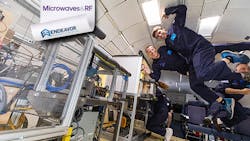This Microwaves&RF article is reprinted here with permission.
Providing fresh food for astronauts in space for extended lengths of time has long been a challenge due to the failure of standard refrigeration methods to work under zero-gravity conditions. But researchers at Purdue University, working in collaboration with air compressor and vacuum specialists at Air Squared, Inc. and refrigeration experts at Whirlpool Corp. have prototyped a refrigerator which may provide the capabilities for effective long-term refrigeration in space under zero-gravity conditions (see the figure).
The space refrigerator project was funded by NASA’s Small Business Innovation Research (SBIR) program to provide essential nutrition for astronauts beyond the three-year shelf life of currently used canned and dried foods brought into space. Experiments on the prototype design were performed in the unique weightless research laboratory managed by Zero Gravity Corp. in a specially designed aircraft (see the figure, again). The experiments, supported by NASA’s Flight Opportunities program, showed that the prototype refrigerator can operate under microgravity conditions as well as it does under normal gravity conditions and that it is not likely to flood under the microgravity conditions that have previously damaged refrigerators used in space. Eckhard Groll, a professor and head of Purdue’s School of Mechanical Engineering, said: “We want to have a refrigeration cycle that is resistant to zero gravity and works to normal specifications. Our preliminary analysis clearly shows that our design allows gravity to have less impact on that cycle.”
About the Author
Jack Browne
Contributing Editor
Jack Browne, Technical Contributor, has worked in technical publishing for over 30 years. He managed the content and production of three technical journals while at the American Institute of Physics, including Medical Physics and the Journal of Vacuum Science & Technology. He has been a Publisher and Editor for Penton Media, started the firm’s Wireless Symposium & Exhibition trade show in 1993, and currently serves as Technical Contributor for that company's Microwaves & RF magazine. Browne, who holds a BS in Mathematics from City College of New York and BA degrees in English and Philosophy from Fordham University, is a member of the IEEE.
